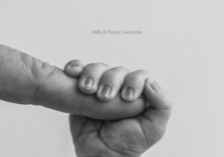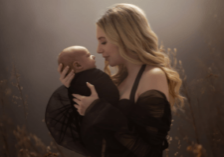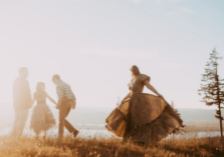Personalizing Your Business to Pay Yourself and Protect Your Mental Health with Lisa Kirkeberg
There are plenty of things that can make running your own photography business challenging, but being able to pay yourself a living wage shouldn’t be one of them.
Our guest today, Lisa Kirkeberg, has had her own struggles, from spending years just making enough in her business to get by to learning how to manage her mental health diagnosis and her business at the same time.
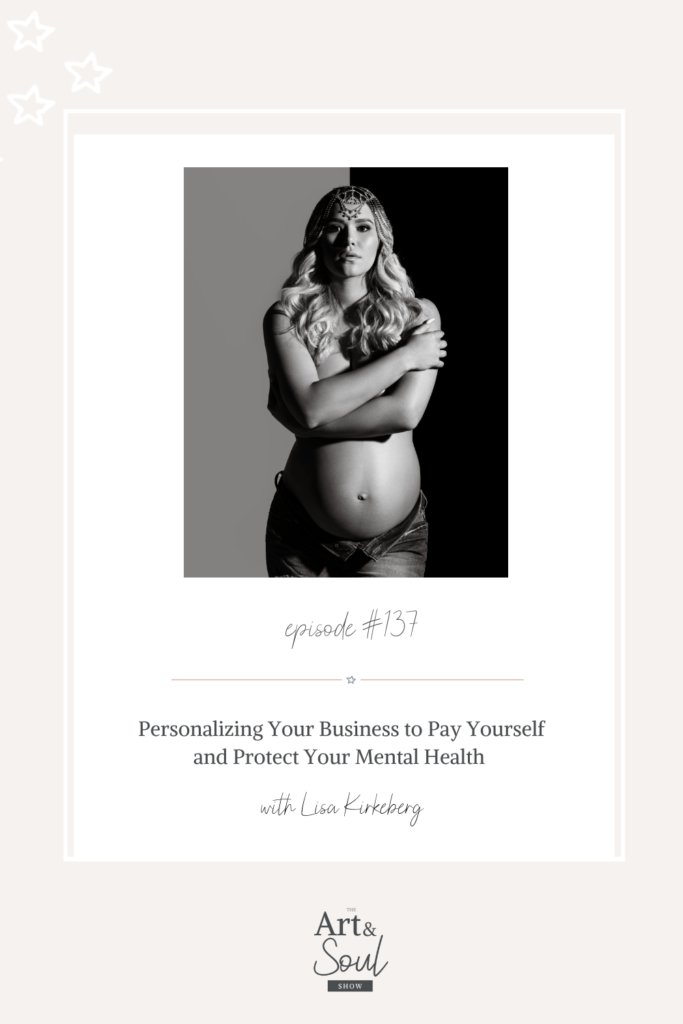
She’s sharing the tips that have helped her transform her photography business into a multiple six-figure venture, from leaning into her finely tuned processes to give each and every client their own personal touch, the lightbulb moment that changed the way she thought about how to pay herself, and how she’s built a business that can give her space to cope with her tougher mental health days.
What’s in this episode:
- [03:26] The personal, customized process that allows Lisa K to make over six figures as a photographer
- [05:49] How Lisa K uses each interaction with her clients to learn and communicate even better the next time
- [08:50] How Lisa keeps burnout at bay by focusing on getting to know each individual client every single time
- [12:54] Why Lisa K is such a fan of therapy and how it’s helped her manage her business and her mental health diagnoses
- [15:37] Lisa’s mindset shift that allowed to her start prioritizing her own paycheck
- [17:17] Why knowing your numbers is the first step to making a profit and paying yourself
- [19:56] Why Lisa K developed her own unique booking system and why it works so well for converting inquiries into clients
If you want to build a business that supports your clients, your mental health, and allows you to pay yourself, tune in to this episode.
SUBSCRIBE: iTunes | Spotify | Stitcher
Resources Mentioned
Meet Lisa Kirkeberg
Lisa went to school for photography 25 years ago. She started her first “business” at around 25 years old and opened her first studio at 28 years old. She finally learned the business of photography in 2017 when deciding to niche as a maternity and newborn photographer. She currently grosses over 200k per year. In 2021 she photographed just over 100 sessions. She currently has an average of 2,500 per session. Ever since learning the business side of photography she is obsessed with focusing on making money and helping others to make a living at their passion.
She is a bronze medalist in the PPA IPC competition and she’s received multiple bronze & silver awards in The Portrait Masters competition.
Connect with Lisa
Did you love hearing Lisa K talk about how to pay yourself and support your mental health while running a photography business? Nakeshia Jackson
Transcript
[00:00:00] Lisa Kirkeberg The single most inspiring. I mean, after 15 years of not making money, when I heard that speech, I was like, Oh my gosh, yeah, I have to do this. Like it is worth it. I also would think about like, what would I get paid if I’m working for someone else? Like the last full time job that I had before quitting to do my business, I was making 50,000 a year. My boss was paying my for my gas and my phone and I had a falling pay and I had health insurance. You know, when I left to start my own business, I wasn’t even able to pay myself that much. But instead of working a 40 hour workweek, I was working from the minute I woke up to the minute I went to bed six, seven days a week. So when you look at it like that, you’re like, I need to take care of myself and pay myself what I would be earning if I were working for somebody else.
[00:00:59] Lisa DiGeso Welcome to the Art and Soul Show, where we dove into heart opening chats on photography, business, life and that messy in between. I’m your host, Lisa DiGeso, a mom, a photographer and entrepreneur. And I’ll be sharing honest conversations and advice for photographers with insight on mindset, entrepreneurship and creativity. The goal of this podcast is for you to be able to gain insights and strategies that will get you real results. Because, let’s face it, having a photography business can be lonely, but it doesn’t have to be. This is the place you can go when you need a boost of encouragement, a kick in the pants and inspiration to pick up your camera. This is the Art and Soul Show.
[00:01:42] Lisa DiGeso Hello, my beautiful friends. Welcome back to the show. Today, I’m hangin with Lisa Kirkeberg. She went to school for photography 25 years ago and started her first business around 25 years old when she opened her first studio at 28 years old. She is a multiple six figure business earner and in 2021, she photographed just over 100 sessions and averaged 2500 per session. So ever since she learned the business side of photography, she’s obsessed with, focused on making money and helping others to make a living at their passion, too. So without further ado, welcome, Lisa.
[00:02:21] Lisa Kirkeberg Thank you. Thank you.
[00:02:23] Lisa DiGeso So tell us a little bit about who you are and really what you’re passionate about.
[00:02:28] Lisa Kirkeberg So I have been passionate about photography for many, many years. I went to school for photography when I was just 18, so I specifically doing maternity now, which I really love and really I’ve just been passionate about helping other people because once I did get obsessed with the business side, I know that so few people focus on that. More people just focus on the creative part. So if I had been there to give myself advice when I was 25, it would be take some business classes, learn, yeah, get some mentors. Then it would have saved me a really long, hard road.
[00:03:11] Lisa DiGeso I love that now. I love what really piqued my interest because money is something that really a lot of our listeners and a lot of our students really struggle with. And I know you’re a multiple six figure earner. Now, can you share your process with your clients that you’re able to charge and earn that amount?
[00:03:26] Lisa Kirkeberg Yeah, so I give a very personalized service. So when I get an inquiry, my goal is to always get them on the phone and I connect with them, find out more about what they’re looking for. That helps me to customize the session for them. And when you put custom in there, it means more expensive. So people start to kind of understand that. And then I do the shoot. I provide professional hair and makeup. I really like create an experience for them that’s unforgettable. Everybody loves that. And then right after the shoot, I go over my products and my prices with them, which they were actually emailed that right after they book. So they’ve seen it before. And then about a week after my session, I go through, I sit down with them and do an in-person ordering appointment and I offer products only. So they get a matching digital file for each image that they choose. But I don’t do digital only options.
[00:04:27] Lisa DiGeso I love that. I love this show because I love being able to bring our listeners all sorts of different ways of running a business and all sorts of ways of being successful. Now you mentioned in your bio that you have an average of 2500 per client. Now, can you share a little bit of a breakdown what your average client would be getting for that?
[00:04:47] Lisa Kirkeberg Yes. So my middle package contains 15 images they can choose if they want an album or if they want matted prints in a folio box. So they basically get 15 images, whether they’re printed or they come with also the digital files. And I don’t have too many requests for digital only options. But if someone’s adamant about it, I forego the products for a 10% discount, which is essentially what my cost is on it.
[00:05:21] Lisa DiGeso Now, what I love about this is you can really tell that you have a streamlined system that really focuses on clear communication with your clients, because that’s something we always hear is like when there is blips or glitches in the communication, that is typically when you have clients that are unhappy because they aren’t sure what they’re getting or you have a photographer unhappy with their clients because they’re not picking images. So can you share a little bit about your communication breakdown that alleviates that?
[00:05:49] Lisa Kirkeberg Yes. So every time I come into a problem, I take that into my next session. I solve it and I learn a new system. I learn a new rule. Or so. One of the main things that I found was at my ordering appointment, some people would be kind of like taken aback by the pricing in the products. And so now when I go over it with them, they get the email after the initial booking. So I say to them, I’m like, Can you find that email? I just want to make sure you have it and can you open that price list? So I tell them right away, I’m like, Did you have a chance to look over the price list? Some people say no. So I’m like, Okay, just pull it up on your phone so you can make sure you have it. And then I’m going to pull it up here too, so we can go over it together.
[00:06:37] Lisa Kirkeberg So that has saved me a lot of problems. And I also just make sure to do the same thing every time I even have a phone script right next to my on my desk. So every person I talk to, I go over the same questions. Even though I’ve been doing it for years, I make sure I have those questions in front of me. That way, if I get distracted or I don’t want to forget anything, basically I want to go through everything the same every time. And in the beginning, before I learned all of the things that I know now, I not only used each learning, like I used everything as a learning experience. Yeah. So now I don’t deviate from that because in the beginning when I was changing things, every time I change something, I realized that the system broke down and I was running into issues. So I’m like, okay, don’t change anything. It gets very boring and very repetitive. But you can’t change a thing because if you do, you’re probably going to end up paying for it financially.
[00:07:47] Lisa DiGeso It’s so true. As soon as you inadvertently create chaos for yourself and you break your own systems, like that’s when things really go haywire. And I like there’s so many times I’ve done that to be completely honest with my own photography business. It was like, I know the process, I know the checklist, but I’ll be like, Oh, like instead of like going through my booking form and going through the email system where it’s all automated, I’ll just respond to that person that messaged me privately on Facebook and I totally from the get go already like broken my system. So I love that. I love like that. You’ve created this like framework and these boundaries that you don’t crack your own system because you know, as soon as you do it will it’ll glitch out.
[00:08:27] Lisa Kirkeberg Yeah, every time I’m like, let me try this. And then I’m like, Why did I try that? Why did I do that? You just have to figure out what works for you and then stick to it. That’s the most important lesson, I think 100%.
[00:08:41] Lisa DiGeso Now, burnout is really a huge thing in our industry. So can you maybe share how you manage 100 clients a year and still feel fresh for every session?
[00:08:50] Lisa Kirkeberg So my I think my typical goal is to kind of get to know my client. That’s where I have I connect with them and I’m able to keep it a little bit fresh because it’s a fresh person that I’m getting to know. I honestly end up doing like I do 5 to 6 during experience session and five of them are the exact same thing that I’ve done 100 times. So it’s I just try to remind myself it’s new to them, so it might be boring for me, but I try to throw in there one look or one lighting set up or one thing that’s new to me or that I want to practice. And a lot of times they do end up choosing that photo as well. So, you know, it’s a win win. I get to try something new, but ultimately just getting to know that person and just that connection, I do offer hair and makeup, so I have a good hour and a half to 2 hours. Just talk to them and get to know them.
[00:09:51] Lisa DiGeso Now do you so you’re there in your studio with them while they’re doing their hair and makeup and getting it done?
[00:09:56] Lisa Kirkeberg Yeah, absolutely.
[00:09:58] Lisa DiGeso And so how did you find a hair and makeup artist that you trust in is liable to show up for your sessions, too?
[00:10:05] Lisa Kirkeberg So when I first started, I used one of those apps. I don’t know if you’re familiar with them, but it’s kind of like a beauty service app. So you can just hire people and then they come to you. So I found people that I liked through the apps, and then it just kind of grew by I use like five or six different people now. And so what happened was if somebody wasn’t available, I’d be like, Oh, do you have anybody you can recommend? And then so it just kind of grew from there. But yeah, obviously one person isn’t available at every time, so I have a little list that I go through.
[00:10:39] Lisa DiGeso I love that because I think a lot of the times, you know, photographers team up with, you know, one photographer or sorry, one her makeup stylist. And if they aren’t available, they’re like, well, I can’t shoot. So I love that you are have you know, you’ve set up your business so you have multiple resources. So they’re working on your schedule and you’re. Working on theirs.
[00:10:59] Lisa Kirkeberg Yeah, exactly.
[00:11:00] Lisa DiGeso That’s smart. That’s smart. Now, what would you say is your biggest advice to support your own mental health and running your own business?
[00:11:08] Lisa Kirkeberg So I believe in therapy.
[00:11:12] Lisa DiGeso Yeah,.
[00:11:12] Lisa Kirkeberg That’s what helps me support my mental health. But I also I have a lot of mental health issues. I actually was diagnosed last year with bipolar. I have problems with anxiety and panic attacks. So I think the thing that has saved me the most is just having everything organized and streamlined and automated. So I have a studio management system set up and it takes me about 30 seconds to add a session in and then they get all their emails to walk them through the process automatically. So when I’ve been in times of great suffering, I just I’m able to kind of automate things and like operate on what do you call it? Like, just operate on autopilot.
[00:11:58] Lisa DiGeso Autopilot.
[00:12:00] Lisa DiGeso Yeah, I love that.
[00:12:01] Lisa Kirkeberg When I’m on auto pilot, it just it’s smooth sailing for me. And, you know, I’ve had some tough sessions, you know, where I wasn’t necessarily in a place where I was super friendly and talkative to my clients. And, and then I’ve had some being bipolar, of course, I’ve had some sessions where I was overly talkative and excited and kind of like it helps me to get through all of that and along with proper medication and things like that. But I think a lot of people struggle with mental illness because it’s not just about like mindfulness. It’s some some people have some serious mental illness and it gets very difficult to kind of run a business during that. But then on the flip side, you also can take the time you need to and work when you need to and you’re on your own schedule. So that helps a lot.
[00:12:54] Lisa DiGeso Absolutely. I love that you touched on and you’re so vulnerable and open about being an entrepreneur with having bipolar and having some form of mental illness. Because I think, you know, there’s a lot of there’s a stigma and that you can’t that you can only be one thing. Right. And you’re like, no, like I’ve created this container where I am a successful business owner who just happens to be diagnosed with bipolar.
[00:13:20] Lisa Kirkeberg Yeah.
[00:13:21] Lisa DiGeso Good for you. That’s that is really. I’m. You should be so proud of yourself. I love that.
[00:13:27] Lisa Kirkeberg I work hard at it
[00:13:28] Lisa DiGeso I’m sure. I’m think I’m probably diagnosed with ADHD, to be completely honest. And I think that probably many artists are. And I think that when you can find a way to manage things and to make certain aspects your superpower, I think that’s I think that’s just so important. Now, you mentioned therapy a little bit too soon. Can you share a little bit on finding a therapist and how that’s benefited your business?
[00:13:53] Lisa Kirkeberg Yeah, absolutely. Luckily, I have really great insurance through my husband’s work because obviously as an entrepreneur, it’s really hard to get great insurance. So yeah, I have a list of different therapies that we’re able to. My husband’s a first responder. He’s a firefighter. So we have a list of people that we can use once a week, every week. Every one of us in the family can go once a week for a year. So I’ve kind of made my way through the list because I’m like, Oh, well, this person is just kind of like talking to a girlfriend and that’s not really helpful.
[00:14:28] Lisa DiGeso So, yeah, so.
[00:14:29] Lisa Kirkeberg I, I found someone, she actually does something special called EMDR where they.
[00:14:36] Lisa DiGeso Oh yeah. The rapid, I mean.
[00:14:38] Lisa Kirkeberg Yeah, exactly. I like that. Yeah. So she does. She’s very like proactive, eh? Let’s do this, let’s do that, let’s do this. And so you know that in conjunction with my psychiatrist who got me on the right medication to kind of level me out, those two things combined. It’s been a lifesaver for me, really.
[00:15:00] Lisa DiGeso I love that. I love that. Now we’re going to switch gears a little bit to talk about mindset and prices, because a lot of photographers have this struggle where it’s like, my clients won’t pay that. And that’s something that we really often hear from our students and our listeners and probably the photographers. Biggest fear is raising our prices. So what mindset shift do you feel photographers need to make to see their value and confidently charge and raise prices?
[00:15:27] Lisa Kirkeberg So the thing that really helps me and I don’t know if I’m allowed to say this, but Sue Bryce had this talk.
[00:15:36] Lisa DiGeso Oh, I love Sue.
[00:15:37] Lisa Kirkeberg Yeah. So she did this speech I think at an imaging or something like that, but when am I good enough to get paid? And it was the single most inspiring. I mean, after 15 years of not making money, when I heard that speech, I was like, Oh my gosh, yeah, I have to do this. Like it is worth it. I also would think about like, what would I get paid if I’m working for someone else? Like the last full time job that I had before quitting to do my business, I was making 50,000 a year. My bosses paying for my gas and my phone. And I had a401k and I had health insurance. You know what? I left to start my own business. I wasn’t even able to pay myself that much. But instead of working a 40 hour workweek, I was working from the minute I woke up to the minute I went to bed six, seven days a week. So when you look at it like that, you’re like, I need to take care of myself and pay myself what I would be earning if I were working for somebody else.
[00:16:40] Lisa DiGeso Yeah.
[00:16:41] Lisa DiGeso And I think there’s a fear of actually crunching the numbers of what those are, especially maybe when you aren’t the sole income or you have a partner who like may be the breadwinner of the family. And so you kind of don’t really look at those numbers as much as you should. And like when I became the breadwinner in our family, it was a huge reality check on the numbers and what I needed to be making.
[00:17:05] Lisa Kirkeberg Yeah.
[00:17:06] Lisa DiGeso It’s it’s interesting, though, like and her first instinct is to, like, almost hide when we see that number, it’s like I didn’t see that that way.
[00:17:17] Lisa Kirkeberg No, absolutely. I think what most photographers do is avoid the numbers. But once you look at, you know, your costs of doing business and you learn to really analyze things and how much your products cost and how much your overhead costs. And once you really break those things down and you see what you’re left with, you’re like, Oh my gosh, I have to raise my prices. Like, I can’t live off.
[00:17:41] Lisa DiGeso This isn’t sustainable. Yeah, absolutely. And really, for many new photographers, especially when they always they we’ve a tendency to look down at what the photographer down the block is doing when it comes to their pricing and just being like, okay, well, so-and-so charges that and then they just kind of park and stay there. So can you maybe share your advice on how they can get away from that, where they should be looking to crunch their numbers? And any advice you have on pricing yourself to actually make a profit?
[00:18:08] Lisa Kirkeberg Yes. So I when it comes to other photographers, aside from the friends that I make, I stay in my lane. I don’t follow them. I don’t follow photographers and social media. I just completely zone in to what I’m doing and keep like we talking about with the numbers. I keep the numbers in my head and I don’t care what somebody else is doing. I do have friends that are photographers that don’t charge anywhere near what I’m charging, and I’ve tried to help lift them up by explaining what I’m doing and what I’m making, and they’re just comfortable where they are because I want to make six figures. That’s important to them, you know what I mean? Like everybody has their own, their own wants and needs. And just because I want more doesn’t mean they want more.
[00:19:04] Lisa DiGeso So 100%. And like everyone really does have their own definition of what success really means to them. You know, it could be six figures or it could be like more time with their kids. Kids, or it could be like right weekends off it really everyone I think really identifying what it is that your own success means to you is such a great starting point to even like know where to even start going.
[00:19:29] Lisa Kirkeberg Yeah, absolutely. And it is a lot of times it is the kids like my kids are 15 and 19 now, so I don’t need to be at home with them every minute. Like, yeah, making arts and crafts and doing homework.
[00:19:42] Lisa DiGeso And, you know, I’m.
[00:19:44] Lisa Kirkeberg I have independence sound.
[00:19:46] Lisa DiGeso Yeah, I love it.
[00:19:49] Lisa DiGeso Now, can you share a quick tip on how to avoid the dreaded inquire and ghost and how you convert your inquiries into bookings?
[00:19:56] Lisa Kirkeberg So I have an initial email that goes out that just says, our bookings and inquiries are handled by phone, and on my contact form I ask, what’s the best time of day to reach them? And so in that initial email I say I’ll be giving you a call at the time that you indicated is best for you. So a lot of times people don’t answer, and my process is I contact them two times by phone. If I don’t hear from them, I’ll text them one time and I send a reminder email out. If I don’t get in touch with them by then, I just archive them. If somebody if I texted them and they takes me back, just wanted your prices or something like that. Then I make another attempt and I say, I need to find out a little bit more about what you’re looking for, to give you an accurate idea of what your investment might look like. So my goal is to constantly get them on the phone. And a lot of people I can’t do that. But that’s okay because if they can’t have a conversation with me for 5 minutes, then they’re not really my client. They’re. Obviously not going to invest 20 $500 into the photos because they’re obviously not that important to them.
[00:21:04] Lisa DiGeso Yeah, that makes sense. So are you ready for our lightning round?
[00:21:09] Lisa Kirkeberg Give it to me.
[00:21:10] Lisa DiGeso Coffee or tea?
[00:21:11] Lisa Kirkeberg Coffee.
[00:21:11] Lisa DiGeso All the most luxurious vacation you’ve ever been on.
[00:21:15] Lisa Kirkeberg So I actually just went to Naples, Florida, for the first time ever instead of going on Priceline and getting the cheapest hotel. We stayed in a hotel that was $750 a night and it was right on the beach. They served us drinks and food and gave us towels and umbrellas. It was it was amazing. It was priceless.
[00:21:41] Lisa DiGeso Love it. Love it. What was your favorite TV show as a kid?
[00:21:45] Lisa Kirkeberg I’m pretty old. So it was Punky Brewster. I don’t know if you know who that is. I think.
[00:21:51] Lisa DiGeso I’m 40. I’m going to be 45 this year.
[00:21:53] Lisa Kirkeberg You know?
[00:21:54] Lisa DiGeso You know. Yeah.
[00:21:58] Lisa DiGeso Last thing you did for yourself as an indulgence.
[00:22:01] Lisa Kirkeberg So I just hired a holistic nutritionist to try to help me get cooking and eating healthier and all of that.
[00:22:10] Lisa DiGeso So love it. Morning person or night owl?
[00:22:14] Lisa Kirkeberg A night owl all the way.
[00:22:17] Lisa DiGeso What did you want to be when you grew up?
[00:22:19] Lisa Kirkeberg So when I was really little, I wanted to be a lawyer or a businesswoman. And I also wanted to live in New York. And I can imagine myself strutting around in high heels and a suit. Now I wear yoga pants every day, so I.
[00:22:36] Lisa DiGeso Know they love it. What’s your go to karaoke jam?
[00:22:41] Lisa Kirkeberg Oh, nobody wants to hear me say no.
[00:22:47] Lisa DiGeso What do you sing in the car when you’re totally alone?
[00:22:49] Lisa Kirkeberg I’m kind of obsessed with Halsey. She’s. Oh, yeah. And, you know, like every song. So. I love it.
[00:22:59] Lisa DiGeso What makes your soul light up right now?
[00:23:03] Lisa Kirkeberg It’s really just helping other photographers. I really love to help people learn, I guess, because I avoided it for so long and just focus on the creative side. I’m just like, you know, let me help you. Show you the light so you can make a living. You don’t have to struggle like I did for 15 years.
[00:23:23] Lisa DiGeso Yeah.
[00:23:24] Lisa DiGeso Fair enough.
[00:23:25] Lisa DiGeso What is the best piece of business advice you’ve ever been given?
[00:23:29] Lisa Kirkeberg To know your numbers? Yeah, absolutely.
[00:23:34] Lisa DiGeso What advice do you have for someone just starting out?
[00:23:36] Lisa Kirkeberg Study the business.
[00:23:37] Lisa DiGeso Right.
[00:23:40] Lisa Kirkeberg Once you have a strong portfolio down, you have a website. You need to learn marketing. You need to learn sales, and you need to learn numbers 100%.
[00:23:52] Lisa DiGeso And I love to end my interviews with this last question. And it is what are you currently curious about artistically curious about?
[00:23:59] Lisa Kirkeberg So lately I’ve been getting really curious about big productions. Like I watch movies and television and I see all these sets and fashion photography and I just wonder, I wish I could just go be a fly on the wall and like, see how they do all this stuff.
[00:24:18] Lisa DiGeso I love that. Well, Lisa, thank you so much for joining me today.
[00:24:22] Lisa Kirkeberg Absolutely. Thank you for having me.
[00:24:25] Lisa DiGeso Oh, my beautiful friends. Thank you for tuning in today. I hope you loved this conversation just as much as I did. And seriously, my beautiful friends, I am sending you so much of my light and love today and every single day. We’ll see you next time.
share the love
[Sassy_Social_Share]
recent
Podcasts
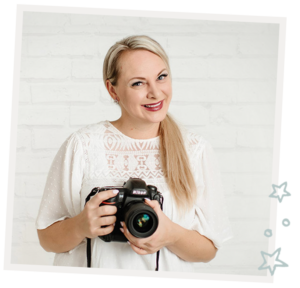
I'm
Lisa DiGeso
I’m on a mission to create uplifting online experiences for photographers ready to elevate their art, their business and their mindset.(...and have fun along the way!)
















